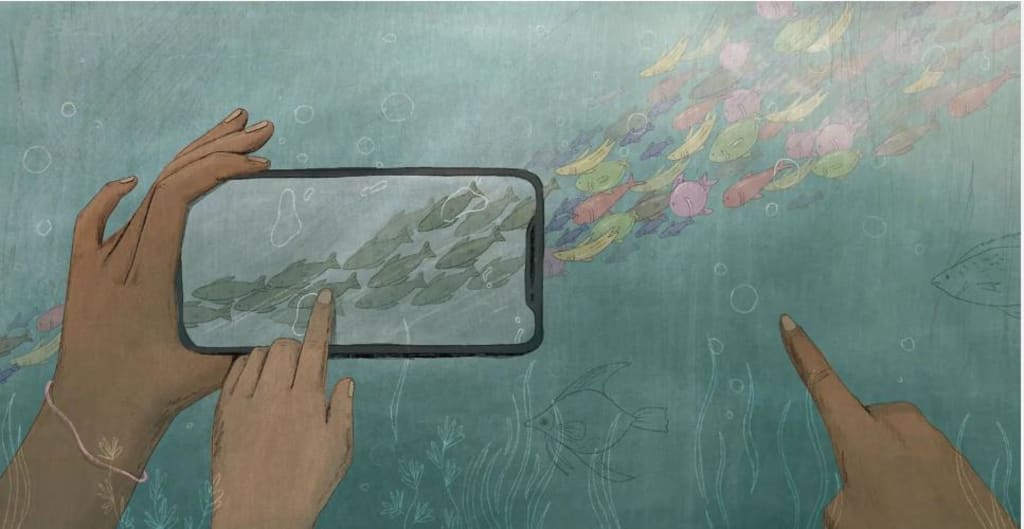Why sex education doesn't have to be awkward
In the digital age, kids need a trusted source they can turn to with questions about love and sex – and research shows how parents can get it right.

I never got the opportunity to do something that's almost a rite of passage among British teens – spend a sex education class peeling a condom out of its stiff foil packet and rolling it down a banana. It wasn't until I was 27 years old that I would finally get to do it, but in a very different capacity. I wasn't learning how to put a condom on. I was learning how I'd teach somebody else to put it on.
About 15 newly trained sex educators and I sat in front of our computers, condommed-bananas in hand. "We often use flavoured condoms," explained our teacher over Zoom, "because the smell is a bit more appealing than normal condoms." He took a moment to look at the participants' expressions, and obviously found some of them looking less passive than he’d hoped. "It's really important that you don't look or feel squeamish when you do this," he said. "That's not how you want young people to feel when you're encouraging them to use these."
Many parents may feel a similar sense of squeamishness when trying to talk to their children about physical intimacy – though attitudes to sex education can vary widely between countries and families, research shows.
A review of research on British parents' involvement in sex education found that they often felt embarrassed, for example, and feared they lacked the skills or the knowledge to talk to their children. However, that same review also found that in countries such as the Netherlands and Sweden, parents talked openly to their children about sex from an early age, and that possibly as a result, teenage pregnancies and sexually transmitted diseases were far less common than in England and Wales.
Parents who do feel awkward talking about sex can find themselves in a difficult spot. Many would like their children to know that they can come to them with questions and problems, especially in the digital age, with children coming across graphic online content at an increasingly young age. But they may struggle to decide when and how to start.

Eva Goldfarb, professor of public health at Montclair State University, co-authored a systematic literature review of the past 30 years of comprehensive sex education. While the review focuses on schools, Goldfarb says her research holds important lessons for parents, too. One basic insight is that sex education has a positive, long-term impact, such as helping young people form healthy relationships. Her advice to parents is not to skip or delay these chats.
"Start earlier than you think," she says. "Even with very young children you can talk about names of body parts and functions, body integrity and control."
This includes talking about issues that parents may not even think about as sex-related, but that are about relationships more broadly: "Nobody gets what they want all the time, it's important to treat everyone with kindness and respect."
In fact, parents tend to find it easier to talk to their children about sex when these conversations start at a young age and come up naturally, separate research suggests. Answering young children's questions openly and honestly can set a positive pattern that makes it easier to talk about more complex issues later.
This step-by-step approach can also be beneficial for children in terms of understanding their own origins and identity. For example, research has shown that children who were conceived with the help of sperm donation, and whose parents explained this from the start with the help of books and stories, felt more positive about their origins than those who found out later.
For parents who want to broach the subject of sex but don't quite know how, research has revealed a number of ways to get started.

What was your own sex education like?
Over the past few years, I have interviewed dozens of sex educators for my book debunking sex myths and misinformation, Losing It. They are pretty much unanimous when it comes to Lesson One of sex education training – figuring out your own level of sex education before considering passing it on to anybody else.
Numerous studies and surveys suggest that adults often do not know as much about sex and the body as they would like to, and may even have completely inaccurate ideas that are grounded in myth or guesswork. For example, many people around the world erroneously believe that the state of a woman's hymen can prove whether she is a virgin – an idea that has no scientific basis.
Parents' basic level of knowledge can vary widely. Some may identify with the subjects of a study in Namibia, which found that many parents didn't talk to their children about sex because they themselves felt that their knowledge about human sexuality, or their ability to explain it, was inadequate. But a survey of almost 2,000 parents of young children in China found that parents' own sexual knowledge and sex education was generally good, though they were less knowledgeable when it came to issues around child development, which made it difficult for them to be effective educators.
Some of the Namibian respondents also avoided the topic because they viewed sex as taboo, or they thought discussing it was going to encourage young people to have sex. The idea that talking to children about sex will encourage them to think about things that aren't age appropriate, or seek out sexual experiences, remains common around the world, including in the US. It tends to be linked to the belief that teaching abstinence from sex until marriage is the best way to protect young people's health and safety.
However, research has shown the opposite. Simply telling teenagers not to have sex has been conclusively proven not to work. The American Academy of Pediatrics calls educational programmes that only promote abstinence "ineffective", based on a systematic review of the evidence. The review also shows that comprehensive sex education helps prevent and reduce the risks of teen pregnancy and sexually transmitted diseases, echoing the findings in the Netherlands and Sweden.

In fact, when parents, and especially mothers, talk to their teenage children about sex, the teens are more likely to delay having sex for the first time, and engage in safer behaviour when they do have sex, especially in the case of girls. The study of British families suggests that it is important to involve fathers in the conversations, too, also because boys often feel sex education tends to be weighted towards the experience of girls.
In short, teaching young people what it truly means to be ready the first time that they have sex, and what to consider when doing so, is far more likely to lead to protect them than not telling them anything.
In Finland, parents prefer calling sex education "Kehotunnekasvatus" – "body emotion education"
What might be helpful, however, is reframing what exactly parents think sex education is. In Finland, researchers conducted an experiment where they changed the name of sexuality education to "Kehotunnekasvatus" – "body emotion education" – and evaluated how early childhood education professionals and parents felt about the term.
The majority preferred the new phrase as it was "more neutral, downplaying thoughts of sex". The researchers note that "one problem impeding the promotion of childhood sexuality education has been the lack of terms free from adulthood connotations", and that using child-centred words might be how many of us are able to talk more easily.
"Using different words for children's sexuality is not a repressed, evasive or euphemistic representation, but can help adults to see the difference and to overcome their rejections, misunderstandings and objections," write the authors.
Such changes can come with a risk, though. One study in India observed that altering the name of a local programme to 'lifestyle' education ended up being counter-productive, sweeping the sex education agenda "under the carpet".
Rephrasing or hiding vocabulary around sex and sexual development when talking to young people also risks accidentally tainting the original words with shame, instead of presenting them as a normal part of a frank conversation.

Step by step
Parents who are unsure when and how to start these conversations may find it helpful to seek out material for schools. In a UK study in 2016, parents who were shown the books used for their children's sex education classes felt that they better understood the subject – and also reported that it made them feel more confident talking to their children about sex. Eva Goldfarb says that it can also be helpful for parents to have evening meetings with their children's sex education teachers and receive information about what their children will be learning at the beginning of the school year.
International guidelines for sex education, such as a comprehensive, evidence-based guide published by Unesco, can also be a good starting point for parents looking for age-appropriate advice. The Unesco guide uses basic, clear ideas around bodies and healthy relationships as building blocks, rather than storing it all up for one big conversation. For a child aged 5-8 years, for example, one key idea is that "everyone has the right to decide who can touch their body, where, and in what way".
For teenagers, the conversations can include discussions around emotional health, such as what it means to take responsibility for oneself and others, or ways to counter peer pressure, as well as providing specific information about condoms and other contraceptives, according to the guide.
Discussing pleasure can help young people practise more safe sex, have more knowledge and positive attitudes about sex - Mirela Zaneva.
One factor has been found to be surprisingly powerful in sex education, but remains relatively little used: pleasure. A new systematic review into health interventions that incorporated pleasure found that explaining enjoyment around sex may encourage safer habits. Programmes that taught people about achieving sexual pleasure were found to improve condom use more than those that focused on the dangers of unprotected sex.
"It’s worth talking about the positives beyond protection, too, such as how using a condom can be fun and can help you connect with a partner," says Mirela Zaneva, one of the study’s authors and a PhD candidate in experimental psychology at the University of Oxford.
Zaneva found that pleasure tends not to be mentioned much, or at all, in sex education. This means that if your child isn't hearing about pleasure from you, it's very likely they're not hearing about it from school, either. "It is likely that a lot of young people miss out on positive, empowering conversations about sex in their current school sex education," she says.
She notes that the Pleasure Project, a public health project involved in the research, offer a range of practical tips on how to incorporate pleasure into discussions with young people around sex.
"The evidence so far is that discussing pleasure can help young people practise more safe sex, have more knowledge and positive attitudes about sex, as well as have more confidence and self-efficacy."
Finding trusted sources
Parents are usually the primary source of sex education for young children, but adolescents tend to tap many sources for information, such as their peers, teachers, and popular culture. And parents may not be the only ones who can feel squeamish. Research undertaken in Ireland found that while in the past, parents' ignorance and embarrassment were the main obstacles to open discussions of sex, nowadays, it was the young people who tended to block these talks, by claiming to already know the facts, becoming irritated or annoyed, or even leaving the room. That does not mean parents should avoid the subject, but it does show how important it is to frame the chats in a way that make everyone feel comfortable.
"Let your child know ahead of time when you want to discuss something delicate, potentially embarrassing or difficult to talk about. They don't feel ambushed this way, and they are more likely to be prepared and to talk with you," says Goldfarb.
Overcoming that squeamishness may even turn out to be freeing experience. After all, sex and healthy relationships – or as the Finnish researchers call it, "body emotions" – are important at any stage of adult life. Young people are at the start of that journey, and have the chance to define values, habits and priorities that can benefit them over a lifetime, not just in intimate situations, but as a part of moving through the world safely and considerately. You may find that it is life-affirming, and not remotely awkward, to be part of that journey.
About the Creator
gaston raphael
Anything one man can imagine, other men can make real.






Comments
There are no comments for this story
Be the first to respond and start the conversation.